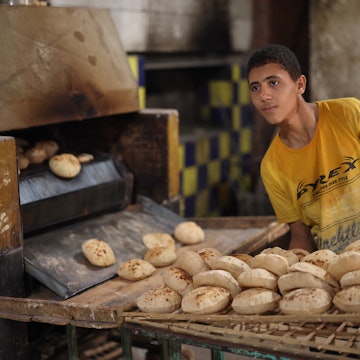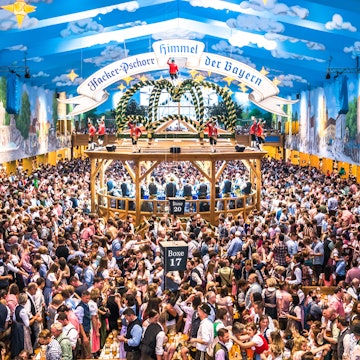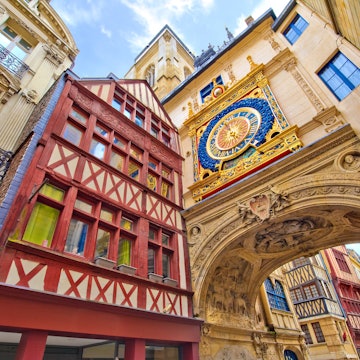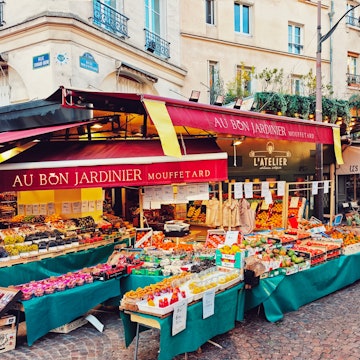
Eat well, do good: 10 restaurants improving the lives of refugees

May 2, 2019 • 6 min read

Devoted food lovers will travel to the ends of the earth for a good meal. But have you ever considered the perilous journey some chefs take in order to cook it? These restaurants, cafes and food projects from around the world have nurtured the talents of countless refugees and asylum seekers, serving up delicious plates with a generous side of social conscience.

Kreuzberger Himmel, Berlin
Germany accepted more refugees and asylum seekers during the peak of the European migrant crisis than any other Western European country. Naturally, integration is top of the agenda for many of the country’s humanitarian organisations. Enter Kreuzberger Himmel, a Syrian restaurant which hires recent arrivals from Afghanistan, Syria and Iraq. One such staffer, Oda Bashi from Syria, claims ‘it’s more than a restaurant. It's family.'
As well as providing crucial opportunities for people whose employment prospects are challenging in Europe, the project gives diners the chance to meet refugees face to face and vice versa, fostering greater understanding – not to mention a love of Syrian food. The menu, which is crafted by the chefs themselves, includes fatteh makdous (stuffed baby aubergine with yoghurt and tomato), kubbeh (meat and bulgur dumplings) and freekeh (a type of green wheat grain) with lamb.
Espai Mescladis, Barcelona
Tucked away in Barcelona’s trendy El Born neighbourhood, Espai Mescladis (roughly translated as ‘mixed space’) is run by a local not-for-profit organisation with the goal of promoting social cohesion. Its three-month Cuinant Oportunitats (Cooking Up Opportunities) programme trains marginalised people to become chefs or waiters, and the open-air cafe is now run by a graduate of the initiative, Soly Malamine, a refugee from Senegal. He embodies the Espai Mescladis mission by sharing his success and helping other refugees to skill up and gain employment in the city.
The Espai Mescladis menu is organic, fair trade and affordable, and includes classic tapas, locally-sourced ice cream and a much-lauded veggie burger. Apprentice chefs also run family-friendly cooking classes and cultural exchange workshops.

Emma’s Torch, New York
‘Give me your tired, your poor, your huddled masses yearning to breathe free’ – these words, taken from refugee advocate Emma Lazarus’ poem The Colossus, are etched onto the Statue of Liberty, and serve as the inspiration behind the culinary training programme and restaurant, Emma’s Torch.
By day, the Brooklyn restaurant is used as a classroom for the apprentices – refugees, asylum seekers and survivors of human trafficking who hail from the likes of Afghanistan, Burkina Faso and Venezuela – and during service, diners eat their homework: new American cuisine such as shawarma spiced lamb loin, grilled cauliflower steak and pistachio bread pudding. Launched in 2017, the non-profit social enterprise has gained support from celebrity chef Rachael Ray and recently opened a second location at Brooklyn Public Library.
Soufra Food Truck, Lebanon
When life gives you lemons, make labneh. Mariam Shaar has done just that, overcoming the odds to build a successful catering business, despite the challenges she faces as a Palestinian refugee in Lebanon. Soufra (meaning ‘feast’ in Arabic) brings together women from the Burj El Barajneh refugee camp outside Beirut as they prepare and serve Middle Eastern treats such as dolma (stuffed vine leaves), makrouta (date cookies) and msakhan (chicken and sumac wraps, which feature in Lonely Planet’s Around the World in 80 Food Trucks).
Their food truck traverses the capital – find out more on their Facebook page, or catch a screening of the recently launched Soufra documentary produced by Susan Sarandon.

Parliament on King, Sydney
The walls of Parliament on King are lined with photos of the people who’ve worked here over the years – a family album of sorts, which is fitting, considering that the bookshop cafe is run from owner Ravi Prasad’s living room. Hundreds of refugees have gained training in hospitality here, as well as a welcoming community, to which Ms ‘H’ from Afghanistan can attest: ‘When I came, I came alone. Parliament was like finding home and friends. It is nice to feel like I am needed and that I am a useful person.’
The menu draws from the staff’s culinary heritage and includes Sri Lankan curries and Burmese noodle dishes. The eccentric space is often open late for life drawing classes and crafty workshops and all proceeds fund refugee and asylum seeker projects and training.
Syr, Utrecht
Launched in 2016 after a record-breaking crowdfunding campaign, Syr serves Syrian-Arabic dishes with a European twist, such as falafel, bitterballen (deep-fried spiced meatballs) and gleaming baklava. This fusion is intentional, with each dish reflecting the merging of cultures seen in Utrecht and the Netherlands since the arrival of 64,000 new residents from Syria – a handful of whom are now learning new culinary skills and improving their Dutch as Syr chefs and waitstaff. Sign up to an evening of wine-tasting or storytelling for the full Syr experience.

Migrateful, London
Aspiring chef? Expand your repertoire while empowering refugees with a cooking lesson from the Migrateful initiative. After working with displaced people in North Africa, France and London, it was while teaching an English class that founder Jess Thompson realised food could help build cultural connections while providing asylum seekers, refugees and migrants with the tools to build a life in the UK. Many Migrateful alumni even run their own catering companies.
Migrateful chefs come from across the globe, meaning guests can learn to cook cuisine from Ethiopia, Albania, Pakistan and more. Classes run at various locations around London and private sessions are available upon request.
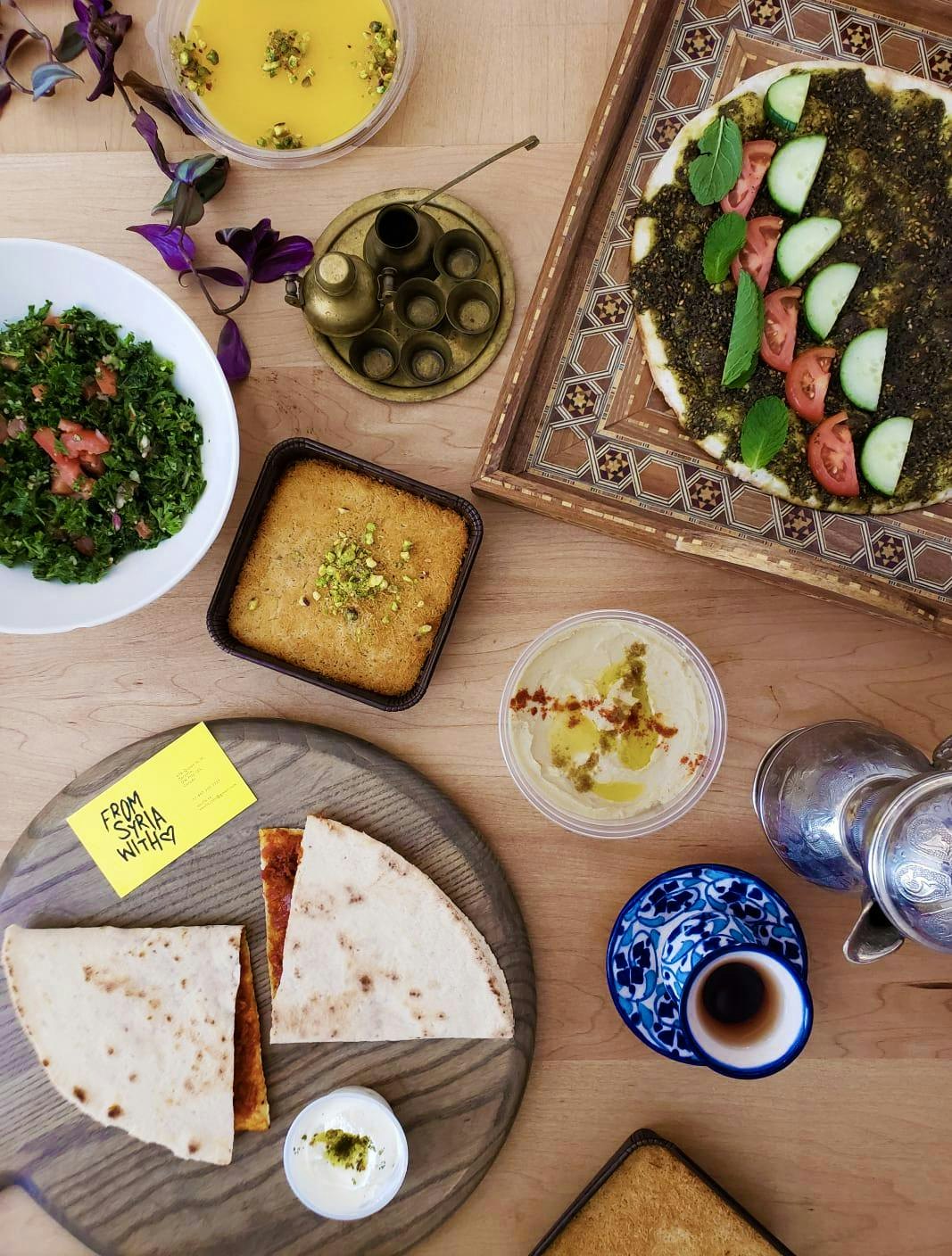
Soufi’s, Toronto
Family-run Soufi’s specialises in two classic Middle Eastern dishes: maneesh (a flavoursome flatbread with various toppings) and knafeh (a syrup-soaked dessert). Jala and her family moved to Toronto in 2012 and 2015 respectively, opening their restaurant in 2017 in order to celebrate their Syrian roots and prove that there’s more to Syria than the devastating scenes you see in the news. The family employs recent refugees to keep their flavours authentic and support newcomers as they transition to a new life in Canada.
1951 Coffee Company, California
Forget where your coffee beans come from – what about your barista? Every year at 1951 Coffee Company in Berkeley, 100 refugees, asylees and special immigrant visa holders from all over the world are trained to serve a decent brew. The cafe’s own-brand coffee is a hit with local caffeine fiends, with a third location opening at Berkeley BART station in early 2019 to complement the flagship cafe and college outlet.

Refugee Food Festival, Paris
Today the Refugee Food Festival is a global movement, but it all started in Paris. The week-long festival – dreamt up by two French food journalists after a trip through 18 countries including Nepal, Cambodia and Oman – takes place each June, encouraging restaurants to open up their kitchens and host chefs from war-torn nations, to educate, inspire and pique curiosity through food.
The first edition launched with support from the UN Refugee Agency in 2016. Co-founders Louis and Marine didn’t expect the festival to have such a wide and lasting impact, but the events sold out within a couple of days, media coverage was high and job offers came flooding in for participating refugees. Three years later and the festival is taking place in 16 cities around the world in 2019, including debuts in Copenhagen and London.







